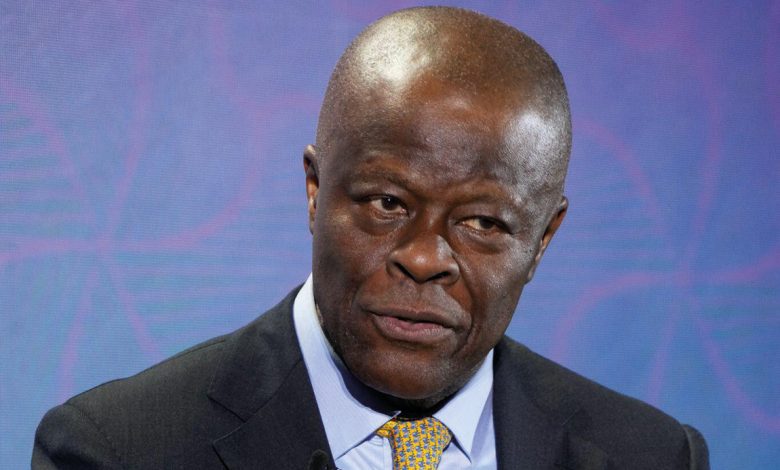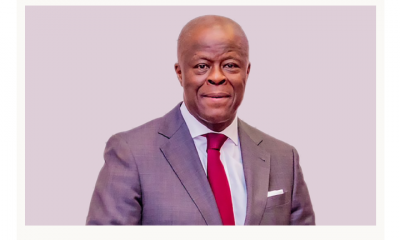Business
As Wale Edun Re-awakens an Economy on the Edge of Collapse

As Wale Edun Re-awakens an Economy on the Edge of Collapse
When President Bola Tinubu appointed Olawale Edun as Nigeria’s finance minister and coordinating minister of the economy in August 2023, many analysts wondered how he, alongside his colleagues in the fiscal and monetary authorities, would rejig an economy on the edge of total collapse.
A few months before the appointment was announced, Tinubu had just won a brutally disputed February 2023 presidential election, which was being challenged by his main opponents in court at the time. Vice President Atiku Abubakar, candidate of the People’s Democratic Party (PDP) and Peter Obi, the candidate of the Labour Party, both came second and third in the keenly contested elections. Both men claimed that the elections were rigged, and that Tinubu should be so removed from office.
Although Tinubu’s elections would later be confirmed by the election tribunals and the Supreme Court, the administration at the time faced serious legitimacy issues.
In that sense, among market analysts and economic experts, Wale Edun’s job was considered near-impossible.
It is important to state clearly that the scepticism that trailed his appointment didn’t stem from any doubt about Wale Edun’s expertise and competence to drive the reform; far from it!
In fact, he came very prepared for the job, as results of the past few months have shown.
Olawale Edun has a background in merchant banking, corporate finance, economics and international finance at both national and international levels. He is a former Chair of ChapelHillDenham Group, Lagos, a leading investment bank. He was an executive director of Lagos merchant bank, Investment Banking & Trust Company Limited, now Stanbic IBTC. He is also the Chair of Livewell Initiative, a not for profit organisation that specialises in health literacy advocacy and practical training in Nigeria, and a Trustee of Sisters Unite for Children, a not for profit institution that focuses on helping street children in Lagos.
But there were just too many hurdles for the President Bola Tinubu government to cross at the time, amid poor fiscal position, widespread poverty, dwindling revenues and drifting economy.
At the time of Edun’s appointment, Nigeria’s inflation rose to an 18-year high in July 2023. The country also faced widespread insecurity, mounting debt burden, high unemployment and slow growth which stoked tension among the population already struggling with a high cost of living.
To rejig the economy, Tinubu decided to embark on some of the boldest reforms that Nigeria has seen in years, including scrapping a popular but costly petrol subsidy and removing exchange rate restrictions.
Consequently, the naira weakened to record lows amid sky-high inflation and poverty.
Gains of Reforms
But in recent months, the pains witnessed by Nigerians seem to be paying off gradually as the gains of reforms are now manifesting.
Nothing demonstrates the confidence being restored in the local economy like how Nigeria recently achieved a milestone with its first-ever domestic dollar bond, which was oversubscribed by 180%.
Initially aiming to raise $500 million, the government finally secured $900 million in commitments. This result surprised many, given Nigeria’s fragile economic situation.
Wale Edun described the bond as a landmark for the country’s domestic market, adding that this success demonstrates investors’ confidence in the country’s ability to turn the economy around.
The bond, with a 9.75% coupon paid semi-annually over five years (an effective rate of 9.99%), is aimed at financing strategic projects in key sectors such as energy and infrastructure. The bond is part of a broader $2 billion program registered with Nigeria’s Securities and Exchange Commission. According to the terms of the issuance, the government has the option to absorb additional subscriptions up to the program’s full $2 billion limit.
The 180% oversubscription was indeed a major victory, drawing interest from Nigerian investors, the diaspora, and international institutions.
But before then, there has equally been some gains in the economy, all pointing towards Edun—-and indeed Tinubu’s—-rejig of the economy.
Already, the Federal Government no longer depends on the Central Bank of Nigeria (CBN) to fund its emerging obligations,a major part of the fruits being yielded by ongoing efforts to improve efficiency and ramp up revenues.
In September, Edun said the government has exited the use of Ways and Means advances for meeting emerging financing obligations, a practice that had been rampant until recently.
Within the periods, the federal government through the Central Bank of Nigeria cleared all outstanding matured and verified FX backlogs totaling $6 billion owed to various creditors, including foreign airlines.
All of the payments were without any depletion in the nation’s foreign reserves. Rather, the reserves have risen to a high of $41 billion, even as the nation remains at a far better fiscal position than it was before the new government came in, now meeting its obligations to creditors without hassles.
In recent months, it has become equally obvious that government was working to plug all loopholes and optimise Nigeria’s financial potential by ensuring that the country’s sovereign assets are fully harnessed for growth and development. Nigeria has huge stranded assets, which the government is expected to unlock to boost its financing liquidity, and efforts are being directed towards this path in recent months.
Another major gain of the government’s macroeconomic reforms is that the country now records a monthly net inflow of about $2.35 billion into its foreign exchange (forex) reserves in the recent months, an inrease that has contributed significantly to the stability of the naira in the forex market. Consequently, between Monday and today, Wednesday, the Naira has gained over N140 in the parallel market while strengthening and stabilizing in the orthodox market.
One equally important development that demonstrates the efficacy of Edun’s managerial competence was evident in the recent endorsement of the economic reforms by the International Monetary Fund. In her engagement with President Tinubu in November, the Managing Director of the International Monetary Fund, Kristalina Georgieva, commended Nigeria’s economic reforms under the leadership of Tinubu.
The IMF chief highlighted the progress made by Nigeria in its quest for economic stability and assured that the IMF remains strongly committed to supporting Nigeria on its path to recovery and sustained development.
What all of these have shown is that while reforms championed by Edun, Cardoso and others can be painful and tortuous, the gains can only reset a collapsing economy and fix a better future for younger Nigerians.
Like Georgieva said, the reform will surely “accelerate growth and generate jobs for its (Nigeria’s) vibrant population.” Surely, Wale Edun and others deserve all the support they can get.
Bank
Alpha Morgan to Host 19th Economic Review Webinar

Alpha Morgan to Host 19th Economic Review Webinar
In an economy shaped by constant shifts, the edge often belongs to those with the right information.
On Wednesday, February 25, 2026, Alpha Morgan Bank will host the 19th edition of its Economic Review Webinar, a high-level thought leadership session designed to equip businesses, investors, and individuals with timely financial and economic insight.
The session, which will hold live on Zoom at 10:00am WAT and will feature economist Bismarck Rewane, who will examine the key signals influencing Nigeria’s economic direction in 2026, including policy trends, market movements, and global developments shaping the local landscape.
With a consistent track record of delivering clarity in uncertain times, the Alpha Morgan Economic Review continues to provide practical context for decision-making in a dynamic environment.
Registration for the 19th Alpha Morgan Economic Review is free and can be completed via https://bit.ly/registeramerseries19
It is a bi-monthly platform that is open to the public and is held virtually.
Visit www.alphamorganbank to know more.
Business
GTBank Launches Quick Airtime Loan at 2.95%

GTBank Launches Quick Airtime Loan at 2.95%
Guaranty Trust Bank Ltd (GTBank), the flagship banking franchise of GTCO Plc, Africa’s leading financial services group, today announced the launch of Quick Airtime Loan, an innovative digital solution that gives customers instant access to airtime when they run out of call credit and have limited funds in their bank accounts, ensuring customers can stay connected when it matters most.
In today’s always-on world, running out of airtime is more than a minor inconvenience. It can mean missed opportunities, disrupted plans, and lost connections, often at the very moment when funds are tight, and options are limited. Quick Airtime Loan was created to solve this problem, offering customers instant access to airtime on credit, directly from their bank. With Quick Airtime Loan, eligible GTBank customers can access from ₦100 and up to ₦10,000 by dialing *737*90#. Available across all major mobile networks in Nigeria, the service will soon expand to include data loans, further strengthening its proposition as a reliable on-demand platform.
For years, the airtime credit market has been dominated by Telcos, where charges for this service are at 15%. GTBank is now changing the narrative by offering a customer-centric, bank-led digital alternative priced at 2.95%. Built on transparency, convenience and affordability, Quick Airtime Loan has the potential to broaden access to airtime, deliver meaningful cost savings for millions of Nigerians, and redefine how financial services show up in everyday life, not just in banking moments.
Commenting on the product launch, Miriam Olusanya, Managing Director of Guaranty Trust Bank Ltd, said: “Quick Airtime Loan reflects GTBank’s continued focus on delivering digital solutions that are relevant, accessible, and built around real customer needs. The solution underscores the power of a connected financial ecosystem, combining GTBank’s digital reach and lending expertise with the capabilities of HabariPay to deliver a smooth, end-to-end experience. By leveraging unique strengths across the Group, we are able to accelerate innovation, strengthen execution, and deliver a more integrated customer experience across all our service channels.”
Importantly, Quick Airtime Loan highlights GTCO’s evolution as a fully diversified financial services group. Leveraging HabariPay’s Squad, the solution reinforces the Group’s ecosystem proposition by bringing together banking, payment technology, and digital channels to deliver intuitive, one-stop experiences for customers.
With this new product launch, Guaranty Trust Bank is extending its legacy of pioneering digital-first solutions that have redefined customer access to financial services across the industry, building on the proven strength of its widely adopted QuickCredit offering and the convenience of the Bank’s iconic *737# USSD Banking platform.
About Guaranty Trust Bank
Guaranty Trust Bank (GTBank) is the flagship banking franchise of GTCO Plc, a leading financial services group with a strong presence across Africa and the United Kingdom. The Bank is widely recognized for its leadership in digital banking, customer experience, and innovative financial solutions that deliver value to individuals, businesses, and communities.
About HabariPay
HabariPay is the payments fintech subsidiary of GTCO Plc, focused on enabling fast, secure, and accessible digital payments for individuals and businesses. By integrating payments and digital technology, HabariPay supports innovative services that make everyday financial interactions simpler and more seamless.
Enquiries:
GTCO
Group Corporate Communication
[email protected]
+234-1-2715227
www.gtcoplc.com
Business
BUA Group, AD Ports Group and MAIR Group Launch Strategic Plan for World-Class Sugar and Agro-Logistics Hub at Khalifa Port

BUA Group, AD Ports Group and MAIR Group Sign MoU to Explore Collaboration in Sugar Refining, Agro-Industrial Development, and Integrated Global Logistics Solutions
Abu Dhabi, UAE – Monday, 16th February 2026
BUA Group, AD Ports Group, and MAIR Group of Abu Dhabi today signed a strategic Memorandum of Understanding (MoU) to explore collaboration in sugar refining, agro-industrial development, and integrated global logistics solutions. The partnership aims to create a world-class platform that strengthens regional food security, supports industrial diversification, and reinforces Abu Dhabi’s position as a hub for trade and manufacturing.
The proposed collaboration will leverage BUA Group’s industrial and logistics expertise, Khalifa Port’s world-class infrastructure, and AD Ports Group’s operational experience. The initiative aligns with the objectives of the UAE Food Security Strategy 2051, which seeks to position the UAE as a global leader in sustainable food production and resilient supply chains. It also aligns with Nigeria’s food production- and export-oriented agricultural transformation agenda, focused on scaling domestic capacity, strengthening value addition, improving post-harvest logistics, and unlocking new markets for Nigerian produce across the Middle East, Asia, and beyond.

Photo Caption: L-R: Kabiru Rabiu, Group Executive Director, BUA Group; Cpt. Mohammed J. Al Shamisi, MD/Group CEO, AD Ports Group; Saif Al Mazrouei, CEO (Ports Cluster) AD Ports Group; Abdul Samad Rabiu, Founder/Executive Chairman, BUA Group; and Steve Green, Group CFO, MAIR Group
Through structured aggregation, processing, storage, and maritime export channels, the partnership is designed to reduce supply chain inefficiencies, enhance traceability and quality standards, and also create a predictable trade corridor between West Africa and the Gulf.
BUA Group—recognised as one of Africa’s largest and most diversified conglomerates, with major investments across sugar refining, food production, flour milling, cement manufacturing, and infrastructure- brings extensive industrial expertise and large-scale operational capability to the venture. MAIR Group will provide strategic support in developing integrated logistics and agro-industrial solutions, creating a seamless platform for production, storage, and distribution.
Abdul Samad Rabiu, Founder and Chairman of BUA Group, said:
“This MoU marks an important milestone in BUA’s international expansion and reflects our long-term vision of building globally competitive industrial platforms. Together with AD Ports Group and MAIR Group, we aim to develop sustainable food production and logistics solutions that strengthen regional supply chains and support the UAE’s Food Security Strategy 2051.”
He further added that, “This partnership represents not just a commercial arrangement but a strategic food corridor anchored on shared economic ambition, resilient infrastructure, and disciplined execution, reinforcing long-term food security objectives for both nations.”
A representative of MAIR Group added:
“This collaboration underscores our commitment to advancing strategic industries in Abu Dhabi and building integrated solutions that reinforce the UAE’s position as a global hub for trade, food security, and industrial excellence.”
A spokesperson from AD Ports Group commented:
“Our partnership with BUA Group and MAIR Group highlights Khalifa Port’s role as a catalyst for high-impact industrial investments. This initiative will enhance regional food security, strengthen global trade connectivity, and support Abu Dhabi’s economic diversification goals.”
This MoU marks a historic collaboration that combines world-class infrastructure, industrial expertise, and strategic vision, setting the stage for a sustainable and resilient food and logistics ecosystem that will benefit the UAE, the region, and global markets alike.
-

 celebrity radar - gossips6 months ago
celebrity radar - gossips6 months agoWhy Babangida’s Hilltop Home Became Nigeria’s Political “Mecca”
-

 society6 months ago
society6 months agoPower is a Loan, Not a Possession: The Sacred Duty of Planting People
-

 society5 months ago
society5 months agoReligion: Africa’s Oldest Weapon of Enslavement and the Forgotten Truth
-

 news6 months ago
news6 months agoTHE APPOINTMENT OF WASIU AYINDE BY THE FEDERAL GOVERNMENT AS AN AMBASSADOR SOUNDS EMBARRASSING






